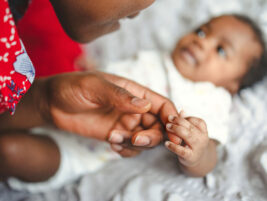On behalf of ZERO TO THREE and as members of the diagnostic revision task force responsible for the development of DC:0-5™ Diagnostic Classification of Mental Health Disorders of Infancy and Early Childhood (ZERO TO THREE, 2016), we congratulate Dr. Campbell Paul on his appointment as President of the World Association of Infant Mental Health (WAIMH) and are grateful for his insightful “Presidential Address: The Rights of Children” in the January 2022 issue of Perspectives.
Dr. Paul presented a compelling address shining a spotlight on the need to recognize that not only are infants and very young children around the world exposed to a variety, and often culmination, of adverse, stressful, and traumatic experiences but that these experiences can negatively impact the infant’s/young child’s mental health and well-being. Dr. Paul made the case that babies come into this world with an emotional life and capacity for intersubjectivity and are to be afforded human rights as would be afforded older children and adults. Acknowledging that infants and young children possess mental health that is largely predicated on the nature of their earliest relationship is critical in recognizing when infants and young children are experiencing mental health challenges, which for some will manifest as impairing clinical symptoms that may be diagnosed as a disorder.
Dr. Paul acknowledged the contribution of DC:0-5 as a diagnostic classification approach that can provide a deeper understanding of the infant/young child’s psychological, emotional, and relational development and experience, all within the context of family, community, and culture. The DC:0-5 approach to diagnosis is developmentally appropriate, relationship-based, contextually driven, and culturally sensitive. The approach recommends a comprehensive, multi-session diagnostic assessment and maintains a multiaxial framework in diagnostic classification providing not only a description of the clinical disorder but also describing the young child’s relational context, physical health conditions and considerations, psycho-social and environmental stressors, and developmental competencies. Cultural formulation is an integral element of the DC:0-5 diagnostic process. Developing a cultural formulation during diagnostic assessment requires critical reflection about the socio-cultural, historical, and political influences on the child and family as well as exploration of issues of power, privilege, and oppression. This is especially important in minimizing the risk of implicit bias in the diagnostic process. It is critical to use the diagnostic framework to honor how families see themselves and their babies in the context of their socio-cultural identifications (Noroña, Lakatos, Wise-Kriplani & Williams, 2021).
We believe that the DC:0-5 multiaxial framework and cultural formulation along with culturally responsive treatment and healing interventions align with Dr. Paul’s call that young children deserve to be noticed, nurtured, and understood in response to crises such as the pandemic, natural disasters, civil and social unrest, racism, and other forms of trauma and family crisis. Culturally responsive assessment, diagnosis and treatment rely on a diverse and culturally responsive clinical workforce that embraces diversity and inclusion in that workforce and a field that can evolve beyond its white, Euro-centric roots to center and embrace non-dominant bodies of knowledge, practice, study, and leadership. While composing the Infant’s Rights Statement, the WAIMH board members (who represent different countries and continents) acknowledged the potential problem of assuming that all cultures and countries around the world could embrace the same standards of care and policies regarding infants and parents. They reached a consensus of about seven basic rights of the infants that should be implemented universally. One of the basic rights is access to diagnosis and treatment of both the infant’s and parent’s clinical symptoms.
The ZERO TO THREE December 2021 Journal issue marked the 5th anniversary of the release of DC:0-5. In those 5 years, nearly 18,000 copies of the manual have been sold worldwide including translations to nine languages–Chinese, Dutch, French, German, Hebrew, Hungarian, Italian, Portuguese, and Turkish. Other translations of the diagnostic manual are underway. DC:0-5TM trainings for clinicians and allied early childhood professionals have occurred across the United States and North America, Europe, Middle East, Africa, Australia, and Asia. It is clear from this global appetite for the DC:0-5 manual and clinical training, that mental health and allied professionals are seeking to identify mental health disorders early in life so that developmentally appropriate and relational interventions may be put into place to mitigate distress and impairment.
ZERO TO THREE had the privilege of bringing an international panel to present virtually at the WAIMH Congress in June 2021. Our presentation was entitled, “DC:0-5TM: How a multiaxial, contextual framework captures the impact of the pandemic and reflects the child’s and family’s story.” Presenters Lynn Priddis and Nick Kowalenko (Australia), Catarina Furmark (Sweden), and Kathy Mulrooney (United States) addressed recognizing mental health issues for young children and their families in a troubled world, specifically considering the impact of the pandemic. The panelists used case-based presentations to highlight that diagnosis goes beyond “labeling” and that a multiaxial approach to diagnosis in infancy and early childhood helps to tell the story of the experience of mental health disorder for the child and their family. ZERO TO THREE’s Diagnostic Classification of Mental Health Disorders, from DC:0-3 through the current DC:0-5 has been clear in the position that while we assess young children and families, we diagnose disorders – not children. A child is NOT their disorder.
In developing DC:0-5 the diagnostic revision task force strove to reach a balance between early identification of impairing symptomatology and access to supports and interventions versus over-pathologizing that could represent the broad range of normative development or cultural norms and expectations. To that end, DC:0-5 developers hoped to mitigate the risk of overdiagnosis by encouraging a comprehensive diagnostic assessment and by using strict criteria for clinical disorder through the diagnostic algorithm, including the necessity to demonstrate that the symptom picture resulted in significant distress and impairment for the young child or family or both.
DC:0-5 exists primarily because more commonly used nosologies such as DSM-5 (APA, 2013) and ICD-11 (WHO, 2019) do not adequately describe early childhood psychopathology. Although research on early childhood psychopathology is newer and less developed than research on psychopathology in older children and adolescents, the task force was able to identify several large data sets, including longitudinal studies, that we used to construct or refine criteria for new and existing disorders. The task force attempted to provide evidence-informed criteria for all disorders.
One of the hopes for DC:0-5 was that it would inspire more research than its predecessors, although published research to date has been limited. There are many potential areas of investigation that will hopefully be explored:
- Community studies of prevalence and patterns of comorbidity of various disorders defined in DC:0-5 to contribute to the determination of the burden of psychiatric disorders in young children worldwide.
- Studies of predictive validity, especially “new disorders,” as well as data about the course, response to treatment, and vulnerability factors.
- DC:0-5 includes several reconceptualizations of disorders, for example, disorder of dysregulated anger and aggression replaced oppositional defiant disorder and the eating disorders. It would be useful to examine the usefulness of these newly constructed disorders.
- Studies on the use and validity of relationship-specific disorder of infancy/early childhood. This disorder represents a radical departure from the tradition of conceptualizing disorders as existing within rather than between individuals.
- Prevalence of “Other” disorders. Because they represent cases that do not meet the diagnostic threshold, the more “other” disorders the more clinical presentations do not match current algorithms, suggesting revisions may be necessary.
As we move forward in this work, resources such as the WHO Nurturing Care Framework (World Health Organization, 2018) the WAIMH Position Paper on the Rights of Infants (WAIMH, 2016), and the Irving-Harris Foundation Diversity-Informed Tenets for Work with Infants, Children and Families (Thomas, et. al., 2018) are essential for asserting the rights, needs, and capacities of infants. ZERO TO THREE is proud to collaborate with Dr. Campbell Paul and WAIMH in advancing the field of infant mental health globally for ALL infants, young children, and their families.
References
American Psychiatric Association. (2013). Diagnostic and statistical manual of mental disorders (DSM-5®) (5th ed.). American Psychiatric Pub.
Noroña, C. R, Lakatos, P. P, Wise-Kriplani, M. & Williams, M. E. (December,2021). Critical self reflection and diversity-informed supervision/consultation: Deeping the DC:0-5 cultural formulation. ZERO TO THREE Journal, 42(2), 62-71.
Thomas, K., Noroña, C. R., St.John, M. S. & The Irving Harris Foundation Professional Development Network Tenets Working Group. (2018). Diversity-informed tenets for working with infants, children, and families. www.diversityinformedtenets.org
WAIMH. (2016). WAIMH Position Paper on the Rights of Infants. WAIMH Perspectives in Infant Mental Health, (Winter-Spring), 24 (1-2), 3-5.
World Health Organization, United Nations Children’s Fund & World Bank Group. (2018). Nurturing care for early childhood development: A framework for helping children survive and thrive to transform health and human potential. Geneva, Switzerland: World Health Organization.
World Health Organization. (2019). ICD-11: International classification of diseases (11th revision). Retrieved from https://icd.who.int/
ZERO TO THREE. (2016). DC:0-5™ Diagnostic Classification of Mental Health Disorders of Infancy and Early Childhood. Washington, DC: ZERO TO THREE.
Authors
Kathleen Mulrooney, USA
Miri Keren, Israel
Charles Zeanah, USA








